Laka has a large collection of music supporting the anti-nuclear struggle. The collection focusses on officially released music, but if appropriate added some digital content too. Music is part of Laka's 'special collections' - the culture of the international anti-nuclear movement - which also includes anti-nuclear songbooks, posters and graphic novels.

In Denmark in the mid-1970s, as everywhere else, voices were heard to start a nuclear power program. Massive protests against the plans followed, and after social pressure the government decided to make the decision dependent on the realization of a final geological disposal for nuclear waste. Finally, in 1985 a law was passed by the Danish parliament, prohibiting power production from nuclear energy in Denmark. Instead, work began on developing wind energy.
Meanwhile, in May 1975, across the Øresund, 20km from the Danish capital Copenhagen, the first reactor of the Barseback nuclear power plant had opened in Sweden. The second reactor followed two years later. In 1977, as the Danish general opinion was opposing nuclear power, the largest Danish antinuclear organization, OOA Organisationen til Oplysning om Atomkraft = Organisation for Information on Nuclear Power) gave priority to directing the attention towards the nuclear programs in neighboring countries, especially Sweden. Nowhere else in the world had one dared to place a nuclear power plant as close to the capital of another country. This was seen as a tremendous provocation.
Meanwhile, in May 1975, across the Øresund, 20km from the Danish capital Copenhagen, the first reactor of the Barseback nuclear power plant had opened in Sweden. The second reactor followed two years later. In 1977, as the Danish general opinion was opposing nuclear power, the largest Danish antinuclear organization, OOA Organisationen til Oplysning om Atomkraft = Organisation for Information on Nuclear Power) gave priority to directing the attention towards the nuclear programs in neighboring countries, especially Sweden. Nowhere else in the world had one dared to place a nuclear power plant as close to the capital of another country. This was seen as a tremendous provocation.
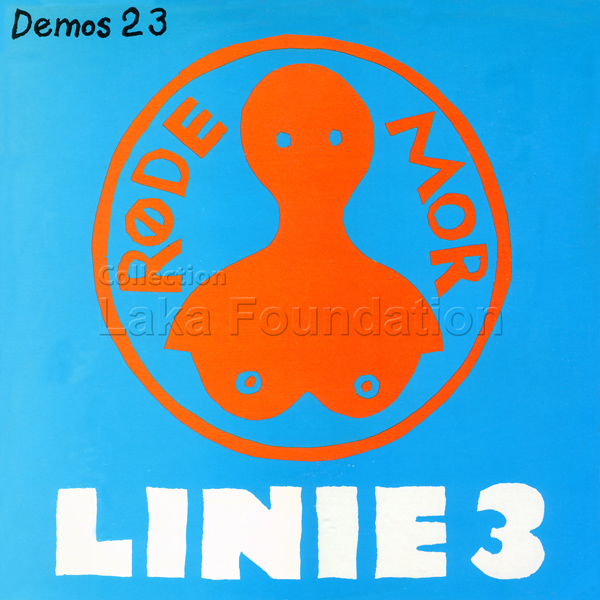
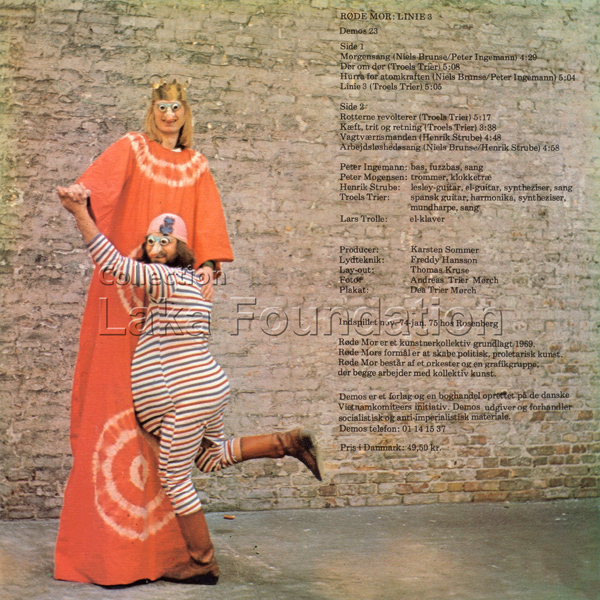
Røde Mor
Linie 3
LP vinyl, 1975
Danish music/theater/art collective founded 1969 with the purpose of making "political, proletarian art". The collective counted musicians, actors, writers and visual artists. The group's recorded music was written for plays or cabarets. The division of the greater collective that worked with music was also called "Røde Mor Rockcircus". Røde Mor became also the name of the record company established in 1976, as a vehicle to release their own records, at a point where their previous label, Demos was divided into two fractions due to disagreements on the political and cultural direction.
Coincidentally, the title of this 1975 album Linie 3 (their fifth), with the sarcastic song Hurra for Atomkraften, was the name of the antinuclear ballot in the Swedish Referendum of March 1980; Linje 3. The band was also popular in Sweden, hence it’s contribution to the Swedish 1975 anti-nuclear compilation Vi Kan Leva Utan Kärnkraft, with the song Kärnkraft.
In 2002, Røde Mor was reunited with an anniversary tour under the name Røde Mor's Rolling Rollator Show. In 2007 Røde Mor, at the Danish Music Awards, was awarded the IFPI Honorary Award, the Danish branch of the record labels' international trade organization IFPI.
Listen to the song Sang om A-Kraft, written and performed by Agitpop.
Coincidentally, the title of this 1975 album Linie 3 (their fifth), with the sarcastic song Hurra for Atomkraften, was the name of the antinuclear ballot in the Swedish Referendum of March 1980; Linje 3. The band was also popular in Sweden, hence it’s contribution to the Swedish 1975 anti-nuclear compilation Vi Kan Leva Utan Kärnkraft, with the song Kärnkraft.
In 2002, Røde Mor was reunited with an anniversary tour under the name Røde Mor's Rolling Rollator Show. In 2007 Røde Mor, at the Danish Music Awards, was awarded the IFPI Honorary Award, the Danish branch of the record labels' international trade organization IFPI.
Listen to the song Sang om A-Kraft, written and performed by Agitpop.
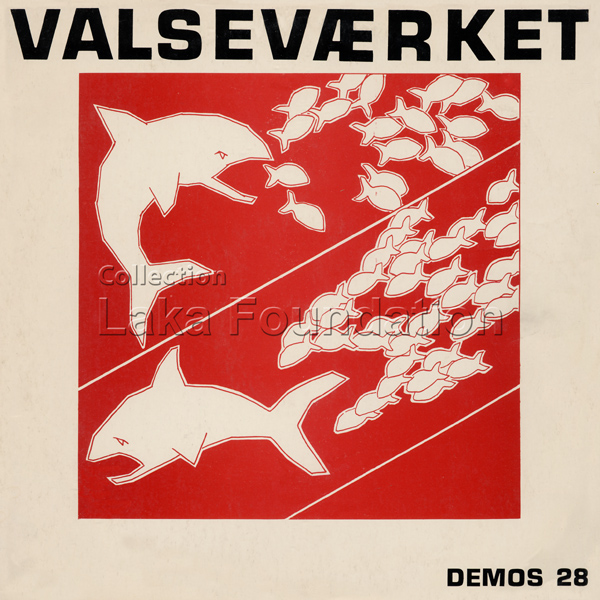
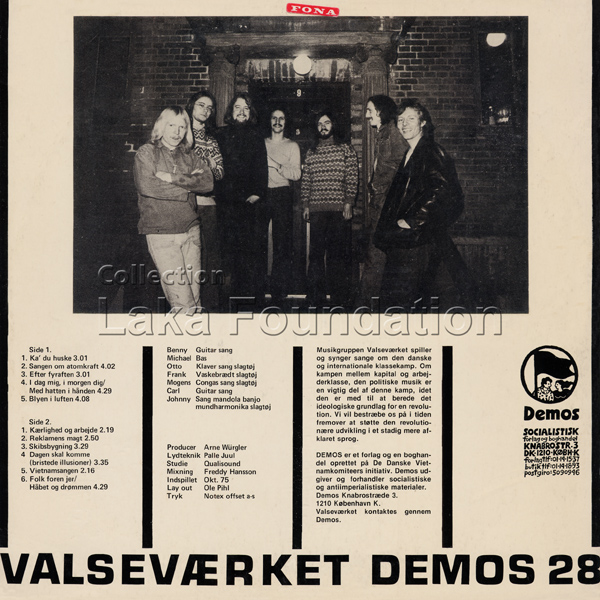
Valseværket
Valseværket
LP Vinyl, 1976
The music group Valseværket plays and sings songs about the Danish and international class struggle. In the struggle between capital and the working classes, political music plays an important part. “In the future,” the band writes on the cover “we will strive to support the revolutionary development in an increasingly clear language.” However, this is Valseværket’s only album, recorded in October 1975 and released in 1976. Valseværket was part of the Tekst & Musik-kollektivet, a collective of five Danish 70's political rock groups, which released one album (Omslag, 1978) as a collective.
Listen to the song Sangen om Atomkraft, written and performed by Valseværket.
Listen to the song Sangen om Atomkraft, written and performed by Valseværket.
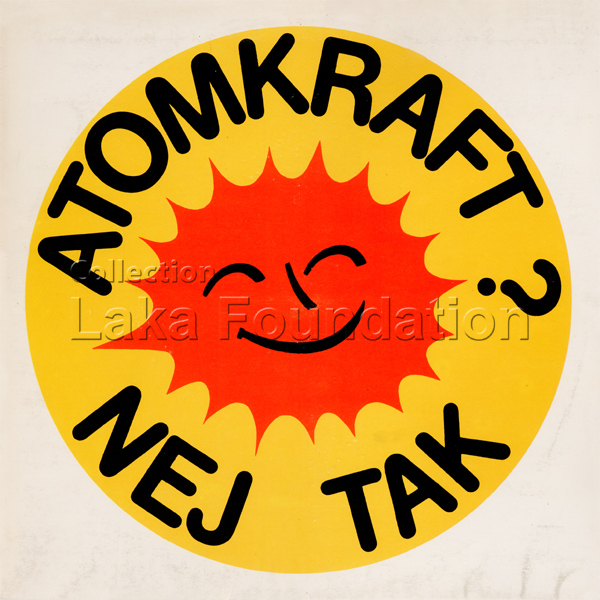
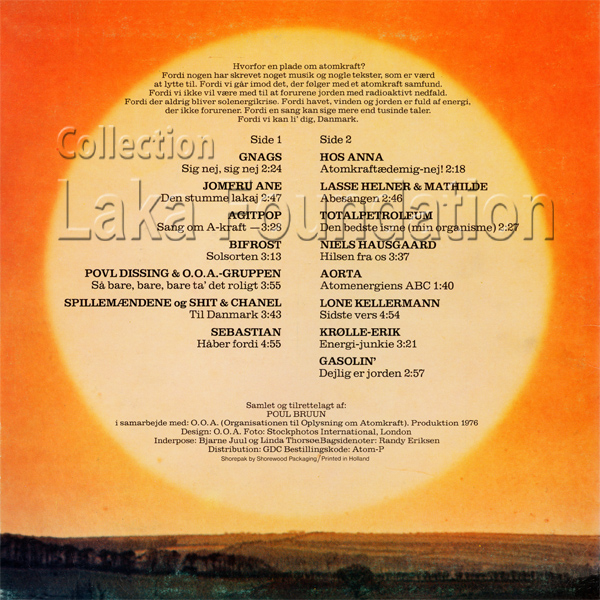
Various Artists
Atomkraft? Nej Tak
LP, 1976
One of the first cultural milestones in the history of the Danish national anti-nuclear organisation Organisation til Oplysning om Atomkraft (OOA) is the publication of 'Atomkraft? Nej tak' record in 1976, with contributions from a host of the great bands of the day such as Gnags, Bifrost, Sebastian and Gasolin. Gnags' song 'Sig nej, Sig nej', featuring Anne Linnet and Lis Sørensen on vocals, becomes a big hit. So is Jomfru Ane's song 'Plutonium Blues'. The fact that this Nej tak album is included in the ten CD boxset Dansk Rock Historie 1965 – 1978 -released in 2020 - shows the popularity of the OOA-compilation. It shows also the popularity of protest-music, since the boxset includes also original albums by Røde Mor and Jomfru Ane Band
Decades later, the song 'Sig nej, Sig nej' by the Gnags was included in Klima Alarm – Klimakrise nej Tak!, a compilation album released prior to the 2009 COP15 UN Climate Change Conference in Copenhagen.
Listen to the song Sig nej sig nej, written and performed by Gnags.
Decades later, the song 'Sig nej, Sig nej' by the Gnags was included in Klima Alarm – Klimakrise nej Tak!, a compilation album released prior to the 2009 COP15 UN Climate Change Conference in Copenhagen.
Listen to the song Sig nej sig nej, written and performed by Gnags.
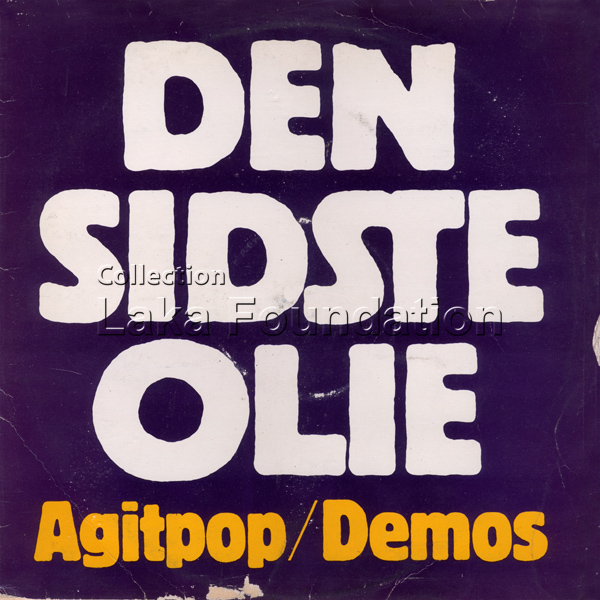
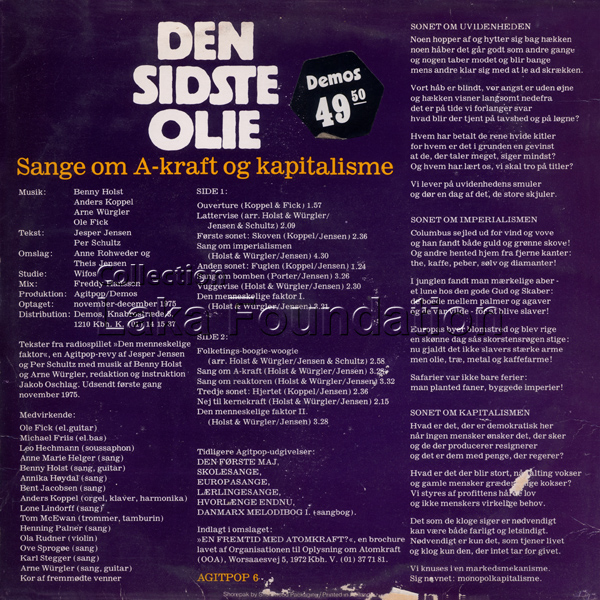
Agitpop
Den sidste Olie. Sange om A-kraft og kapitalisme
LP, 1976
In 1975, Danish Radio broadcasts the radio play 'Den Menneskelig Faktor' (The Human Factor) about the evolution of man from the Stone Age of kitchen muck to the Atomic Age of reactor waste. A revue by the music drama collective 'Agitpop' written by Jesper Jensen and Per Schultz with music by Benny Holst and Arne Würgler. The radio play is part of the Demos/Agitpop album 'Den sidste Olie. Sange om A-kraft og kapitalisme (The Last Oil. Songs about A-power and capitalism) from 1976. The release included lyrics and a 22-page booklet published by OOA.
Agitpop was a Danish 70's political rock/folk band formed in 1971 in Copenhagen. The group worked purposefully with socialist agitation and proletarian cultural production in a use-oriented, anti-elitist form. Agitpop's records were provided with lyrics and harmonies, and they helped renew communal singing in the 1970s. Demos was a socialistic danish label, publishing firm and bookshop established in 1969 by Danish anti Vietnam war committees.
Listen to the song Sang om A-Kraft, written and performed by Agitpop.
Agitpop was a Danish 70's political rock/folk band formed in 1971 in Copenhagen. The group worked purposefully with socialist agitation and proletarian cultural production in a use-oriented, anti-elitist form. Agitpop's records were provided with lyrics and harmonies, and they helped renew communal singing in the 1970s. Demos was a socialistic danish label, publishing firm and bookshop established in 1969 by Danish anti Vietnam war committees.
Listen to the song Sang om A-Kraft, written and performed by Agitpop.
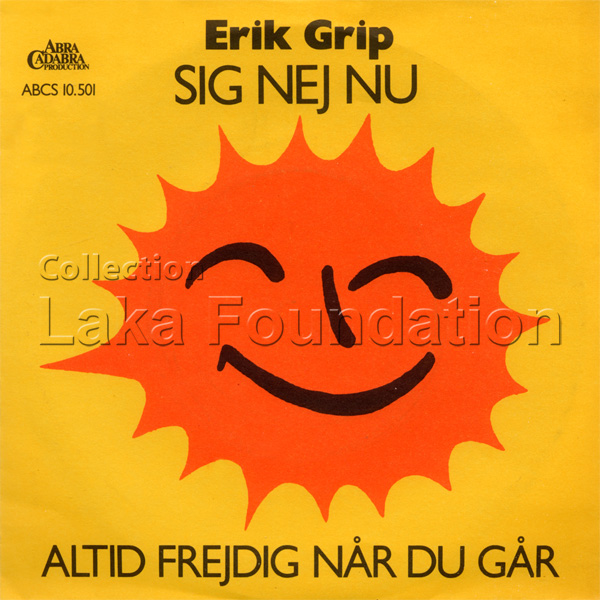
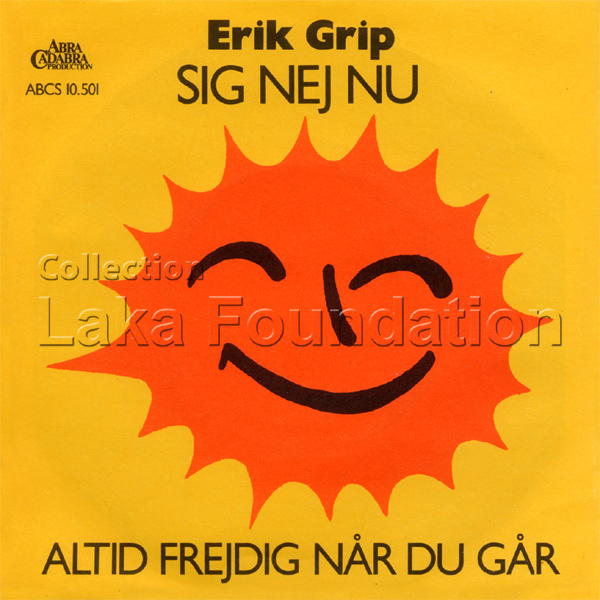
Erik Grip
Sig Nej Nu
Single 45 rpm, 1976
Erik Grip is a Danish folksinger/songwriter and guitarist, born in 1947. He started recording in 1970 as folkduo Erik & Annemarie. This A-side Sig nej Nu (Say No Now) was released in 1976 at the hay-day of the Danish debate on nuclear power and just after the startup of the first Barseback-reactor. The two sides pf teh sleeve, with the smiling Sun, are identical. In 2021 Gripp was awarded the Danish Folk Music Prize 2020. In 2022 he released Jeg Er Her Endnu (I’m still here), which was reissued in 2023 to celebrate Grip's 60th anniversary as performer, accompanied by a ‘60 year on stage’ anniversary tour.
Listen to the song Sig Nej Nu, written and performed by Erik Grip.
Listen to the song Sig Nej Nu, written and performed by Erik Grip.
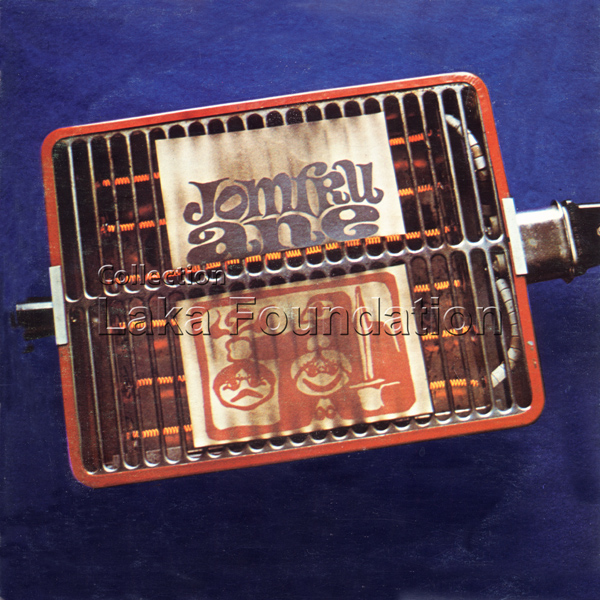
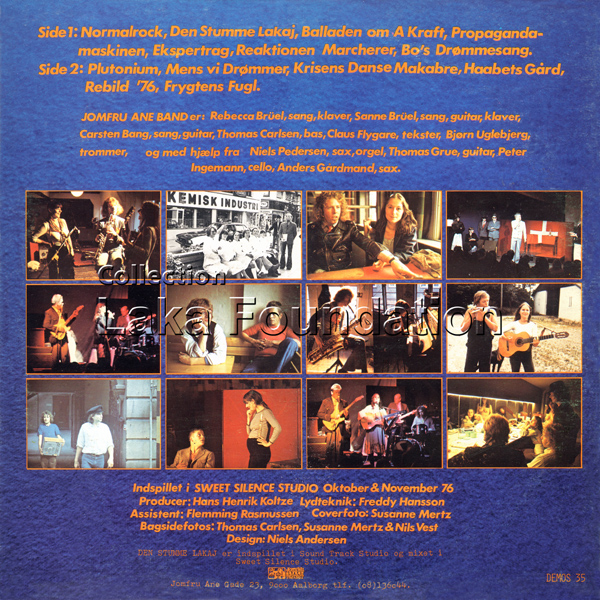
Jomfru Ane Band
Jomfru Ane Band
LP vinyl, 1977
Jomfru Ane was a Danish band with a clear political expression, their lyrics among other things protesting against American imperialism and the use of nuclear power in Denmark. The name refers to "Jomfru Ane Teatret" from where the group originated. Jomfru Ane Teatret was an experimental theatre group in Aalborg (Denmark), which had it's first performance April 19th 1967. With twinsisters Rebecca and Sanne Brüel as crucial voices and faces, Jomfru Ane Band started in the mid-1970s, their first album recorded in Oct/nov 1976 and released in 1977, and more or less ended in 1982. Over the years, Jomfru Ane Band has produced several – never recorded - plays addressing the nuclear issue. Already in 1974 they performed ‘Atomslagstykket - De hellige køer og den sidste olie' ('The Atomic Battle - The Sacred Cows and the Last Oil').
On this first album (selftitled Jomfru Ane) from 1977, a number of songs about nuclear power: Balladen om A-kraft, Plutonium and Den Stumme Lakaj about the struggle at Brokdorf in neighbouring Germany.
Listen to the song Den Stumme Lakaj, written and performed by Jomfru Ane Band.
On this first album (selftitled Jomfru Ane) from 1977, a number of songs about nuclear power: Balladen om A-kraft, Plutonium and Den Stumme Lakaj about the struggle at Brokdorf in neighbouring Germany.
Listen to the song Den Stumme Lakaj, written and performed by Jomfru Ane Band.
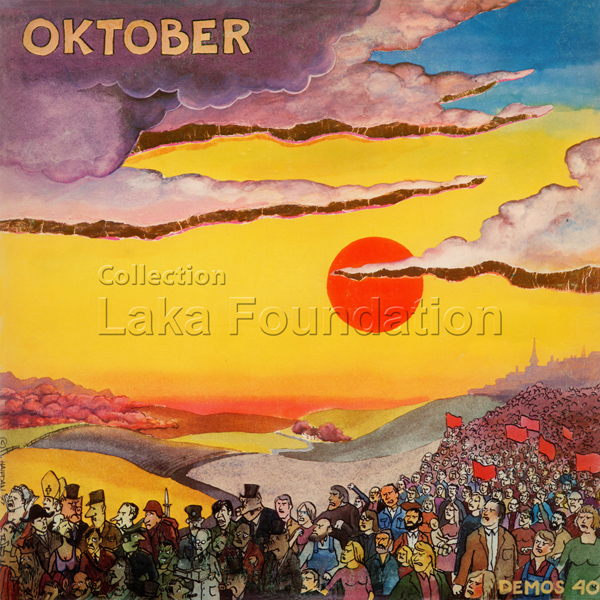
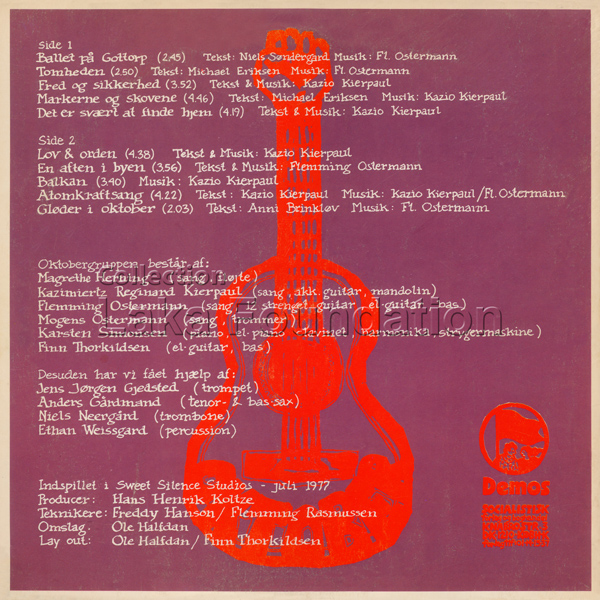
Oktober
Oktober
LP vinyl, 1977
The Danish 70’s polit rock band Oktober (also called sometimes Oktobergruppen ) was a socialist music group that had its roots in the Slumstormer movement. Slumstormers was the nickname of the Danish squatting movement from the mid-60s and 1970s. The movement waned after 1971, when the use of properties that were to be demolished, was legalized until they were demolished. The next wave of house occupations from the early 1980s is referred to as the BZ movement. The Slumstormers released an album in 1971 "det kan blive bedre kamerat" ("it can get better comrade" - which was re-released in 2013). Oktobergruppen were active in the opposition to the EC, and in the period leading up to the referendum in October 1972, they toured Denmark with the EC caravan. After the vote, the group was reformed, and in that formation they recorded this album, with the anti-nuclear song Atomkraftsang.
Listen to the song Atomkraftsang, written and performed by Oktober.
Listen to the song Atomkraftsang, written and performed by Oktober.
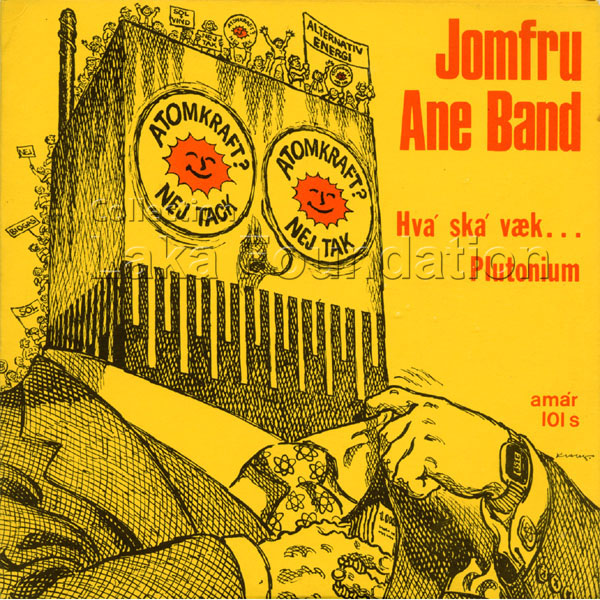
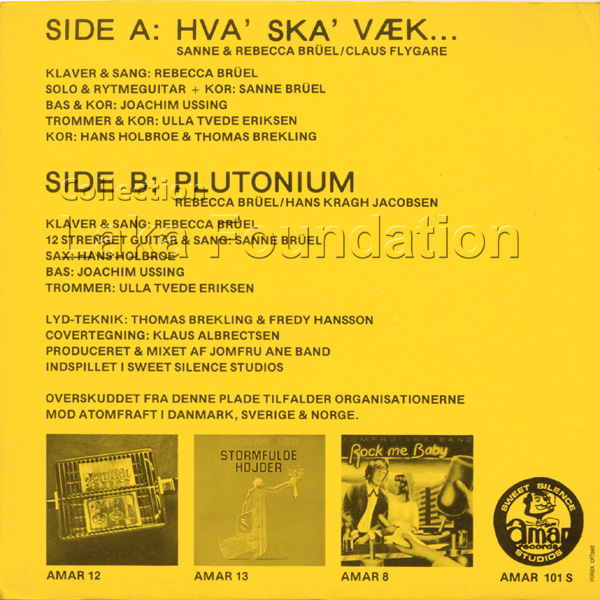
Jomfru Ane Band
Hva' ska' vaek / Plutonium
Single 45 rpm, 1980
The song Plutonium from Jomfru Ane’s first album released in 1977, was re-released at the hight of the Swedish nuclear debate in 1980 as the B-side of the 7” single Hva’ ska’ vaek (What’s going on): “Ja, vi er mange og vi blia flere / der ønsker Barsebåck blir revet ned” (Yes, we are many and we become more / who wants Barseback to be torn down).
“Today we know that the Barsebåck plant has been misplaced. That it poses a constant threat to a million population in the most densely populated area in the Nordic region. We know that even the best contingency plan can not secure us if the accident happens. And we know - after Harrisburg - that it can happen. There can no longer be any doubt: the Barsebåck plant must be closed.” (from the liner notes [Danish]). Rebecca Brüel in 2003: “We helped stop the introduction of nuclear power in Denmark, which the electricity company Elsam was sneaking in through the back door. Here I think we certainly made a contribution that influenced the population”.
Listen to the song Hva' ska' vaek...., written and performed by Jomfru Ane Band.
“Today we know that the Barsebåck plant has been misplaced. That it poses a constant threat to a million population in the most densely populated area in the Nordic region. We know that even the best contingency plan can not secure us if the accident happens. And we know - after Harrisburg - that it can happen. There can no longer be any doubt: the Barsebåck plant must be closed.” (from the liner notes [Danish]). Rebecca Brüel in 2003: “We helped stop the introduction of nuclear power in Denmark, which the electricity company Elsam was sneaking in through the back door. Here I think we certainly made a contribution that influenced the population”.
Listen to the song Hva' ska' vaek...., written and performed by Jomfru Ane Band.
